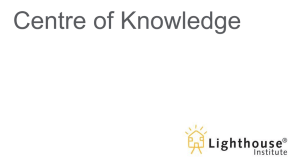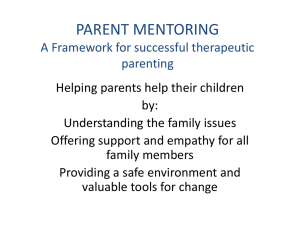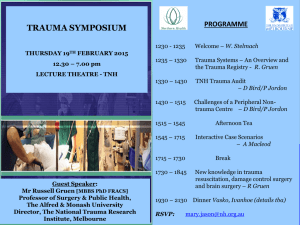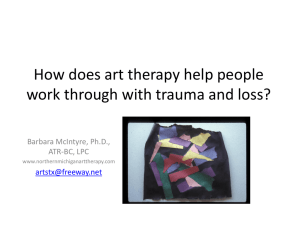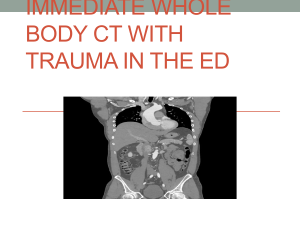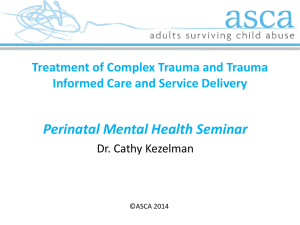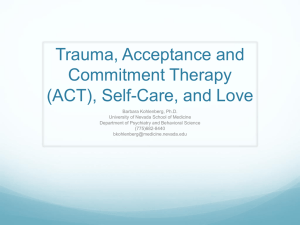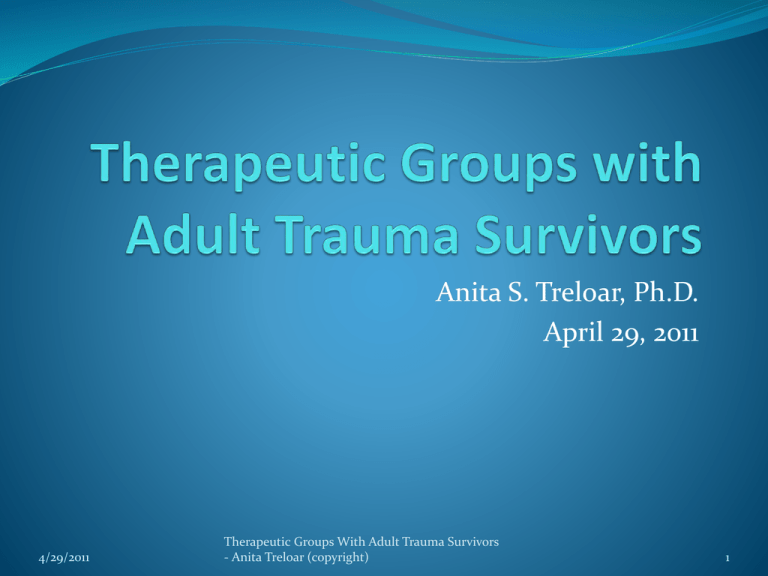
Anita S. Treloar, Ph.D.
April 29, 2011
4/29/2011
Therapeutic Groups With Adult Trauma Survivors
- Anita Treloar (copyright)
1
Presentation Objectives
Participants will understand the basic theoretical basis
for Seeking Safety and Acceptance and Commitment
Therapy (ACT) groups for adult trauma survivors.
Participants will learn the basic structure of Seeking
Safety Groups.
Participants will learn the structure and content of one
example of an ACT group which can be provided for
trauma survivors.
4/29/2011
Therapeutic Groups With Adult Trauma Survivors
- Anita Treloar (copyright)
2
Credits
Information on Seeking Safety Treatment and
Acceptance and Commitment Therapy is derived from
resources noted in Resource List.
4/29/2011
Therapeutic Groups With Adult Trauma Survivors
- Anita Treloar (copyright)
3
Post-traumatic Stress Disorder
(PTSD)
Person exposed to traumatic event that
Involved actual or threat of death or injury
Involved experience of intense fear, helplessness, or
horror
Traumatic event is persistently reexperienced
Persistent avoidance and numbing
Persistent symptoms of increased arousal
4/29/2011
Therapeutic Groups With Adult Trauma Survivors
- Anita Treloar (copyright)
4
Co-occurrence of PTSD and
Substance Abuse
High co-occurrence of PTSD and Substance Abuse
PTSD can elicit substance abuse (e.g., for coping),
which can make client more vulnerable to further
trauma
Recovery from substance use can trigger PTSD or
memories the substance had been blunting
Therapy re. PTSD can trigger substance abuse to cope
with memories
Therefore best to treat them together (e.g., Seeking
Safety approach)
4/29/2011
Therapeutic Groups With Adult Trauma Survivors
- Anita Treloar (copyright)
5
Stages of Healing from PTSD and
Substance Abuse*
1.
Safety: Goals –
Free self from substance abuse
Stay alive
Build healthy relationships
Gain control over own feelings
Learn to cope with day-to-day problems
Protect self from destructive people and situations
Not hurt self or other
Increase functioning
Attain stability
*From Seeking Safety p. 101, derived in part from Herman, 1992.
4/29/2011
Therapeutic Groups With Adult Trauma Survivors
- Anita Treloar (copyright)
6
Stages of Healing from PTSD and
Substance Abuse (continued)*
2. Mourning the past: losses and pain experienced.
3. Reconnection with the world in joyful ways: thriving,
enjoying life, able to work and relate well to others.
*From Seeking Safety p. 101, derived in part from
Herman, 1992.
4/29/2011
Therapeutic Groups With Adult Trauma Survivors
- Anita Treloar (copyright)
7
Theoretical Considerations:
Learning Curve
Individuals learn best at moderate levels of challenge.
Too low challenge: boredom, inattention
Too high challenge: overload, shut down
Moderate challenge: optimal learning
4/29/2011
Therapeutic Groups With Adult Trauma Survivors
- Anita Treloar (copyright)
8
Theoretical Considerations:
Therapeutic Pacing
Pace therapeutic challenge for clients’ moderate range.
“Building emotional muscle.”
Building ego strength, client’s “observing ego.”
4/29/2011
Therapeutic Groups With Adult Trauma Survivors
- Anita Treloar (copyright)
9
Theoretical Considerations:
Session Cognitive-Affective Curve
Generally: start with cognitive, move to affective work,
end with cognitive.
Don’t go deeper than the client can contain.
4/29/2011
Therapeutic Groups With Adult Trauma Survivors
- Anita Treloar (copyright)
10
Advantages of Group Treatment of
Trauma Survivors
Reduces stigma and feeling of isolation; they know
they are not alone
Clients can learn from each other’s experiences
Mutual support is empowering
4/29/2011
Therapeutic Groups With Adult Trauma Survivors
- Anita Treloar (copyright)
11
Challenges to Group Treatment of
Trauma Survivors
Contagion of trauma stories/pain can trigger
memories or “flooding”
One client’s trauma can “hijack” a group session
Boundary problems can create rescuer, victim,
persecutor roles, etc.
4/29/2011
Therapeutic Groups With Adult Trauma Survivors
- Anita Treloar (copyright)
12
Seeking Safety Treatment
Approach
Considered an evidence based best practice
Can be used individually or in groups
Focus on Safety Stage of Healing
Mourning work may take place in parallel individual
sessions.
During mourning work, participants may often need
to return to safety stage.
4/29/2011
Therapeutic Groups With Adult Trauma Survivors
- Anita Treloar (copyright)
13
Seeking Safety Content
Four content areas: cognitive, behavioral,
interpersonal, and case management
Structured format of each session
Present- and problem-oriented to reduce symptoms
Psycho-educational
Affective components are contained in a cognitive
structure.
4/29/2011
Therapeutic Groups With Adult Trauma Survivors
- Anita Treloar (copyright)
14
Seeking Safety Topics
Examples:
Safety
PTSD: Taking Back Your Power
Detaching from Emotional Pain (Grounding)
When Substances Control You
Taking Good Care of Yourself
Integrating the Split Self
Recovery Thinking
Healthy Relationships
4/29/2011
Therapeutic Groups With Adult Trauma Survivors
- Anita Treloar (copyright)
15
Seeking Safety Group Description
Women’s Seeking Safety Group
First Nations Community HealthSource
What is the Women’s Seeking Safety Group Approach?
The Women’s Seeking Safety Group is for women who have experienced trauma and related issues such as substance abuse and domestic
violence, and are seeking a safer, healthier life. Sessions will include both information and the opportunity to share. Participants are usually
also involved in individual counseling.
Is this group right for me?
This group may be right for you if:
You are experiencing consequences of unhealthy choices in your life.
You have experienced a traumatic event or events.
You have difficulty maintaining positive, safe relationships.
Memories or feelings about the traumatic event make it hard to stay clean and sober, or to make healthy choices.
Focus on safety
The #1 goal of these sessions is to help you be safe. “Safety” includes the ability to:
Manage trauma symptoms (such as flashbacks, nightmares and negative feelings)
Cope with life without using substances
Take good care of yourself
Find safe people who can be supportive of you
Free yourself from domestic violence or other abusive relationships
Prevent self-destructive acts (such as cutting, suicidal thoughts, unsafe sex)
Find ways to feel good about yourself and enjoy life.
How can I join this group?
Individuals interested in joining this group may contact Anita Treloar at 262-6586 or the Behavioral Health receptionist at 262-6520.
Membership is open to clients involved in individual therapy through FNCH Behavioral Health services. Sessions will be Wednesdays from
4:00-5:30 p.m. New members may join by coming at 3:30 p.m. on their first Wednesday to meet with Anita for group orientation.
4/29/2011
Therapeutic Groups With Adult Trauma Survivors
- Anita Treloar (copyright)
16
Seeking Safety Treatment
Agreement
Includes safety, honesty, confidentiality
Group treatment agreement includes
Not discussing details of trauma or substance use
Contact with members outside sessions is discouraged
4/29/2011
Therapeutic Groups With Adult Trauma Survivors
- Anita Treloar (copyright)
17
Seeking Safety Group Structure
Check-in:
How are you feeling?
What good coping have you done?
Any substance use or other unsafe behavior?
Did you complete your commitment?
Community resource update?
The quotation (with discussion)
Session topic: readings and discussion related to participants’
lives
Check-out
One thing got out of today’s session
New commitment
What community resource will you call?
4/29/2011
Therapeutic Groups With Adult Trauma Survivors
- Anita Treloar (copyright)
18
Seeking Safety Approach
Questions; Discussion
4/29/2011
Therapeutic Groups With Adult Trauma Survivors
- Anita Treloar (copyright)
19
Acceptance and Commitment
Therapy (ACT)*: Core Concepts
Mindfulness: being in the present
Acceptance (not the same as agreement)
Commitment to valued action
*Steven Hayes; see Resource List
4/29/2011
Therapeutic Groups With Adult Trauma Survivors
- Anita Treloar (copyright)
20
Goals of ACT
Psychological flexibility (see pre- post-assessment
tool)
Requires facing pain that individual may have been
avoiding: this confronts the avoidance strategy of
PTSD
4/29/2011
Therapeutic Groups With Adult Trauma Survivors
- Anita Treloar (copyright)
21
Clients Most Appropriate for ACT
Group*
Preferably clients have demonstrated ability to keep
themselves safe. Some may have completed Seeking
Safety Group.
Ability and willingness to use a complex cognitive
approach.
Especially helpful with clients who have felt stuck in
their progress and want to move forward in their lives.
*Note: Group is developed from resources noted in
Resource List
4/29/2011
Therapeutic Groups With Adult Trauma Survivors
- Anita Treloar (copyright)
22
ACT Group
Acceptance and Commitment Therapy
(ACT)
Helps individuals to:
Accept Your Reactions and Be Present
Choose a Valued Direction
Take Action
This approach is helpful for those experiencing:
Depression, anxiety, substance abuse, post-traumatic stress,
chronic pain, medical issues, and stress.
New twelve week cohort for men and women will start December 3, 2010 at
2:00 p.m. at FNCH Behavioral Health Services, and will meet Fridays from
2:00-3:30. The group is open to FNCH BH clients with assigned individual
therapists. Come join us!
For information, contact Anita Treloar at 262-6520.
4/29/2011
Therapeutic Groups With Adult Trauma Survivors
- Anita Treloar (copyright)
23
ACT Group Topics*
Introduction: ground rules, introduction, pre-test
Avoidance and Control; Pain and Suffering
Pain and Suffering (continued)
Acceptance and Willingness
Passengers on the Bus
Defusion: Handling the Passengers
Defusion (continued)
Who Am I?
Values #1
Values (continued)
Committed Action
Graduation
*Developed from materials in Resource List by Anita Treloar.
1.
2.
3.
4.
5.
6.
7.
8.
9.
10.
11.
12.
4/29/2011
Therapeutic Groups With Adult Trauma Survivors
- Anita Treloar (copyright)
24
ACT Group Format:
12 week cohort model
Check in (thoughts and feelings since last session;
application of last sessions material)
Information
Application through discussion and/or written
material
Check out (what learned, reactions, application to the
week ahead)
Mindfulness exercise (ground in present)
4/29/2011
Therapeutic Groups With Adult Trauma Survivors
- Anita Treloar (copyright)
25
ACT Group
Comments
Discussion
4/29/2011
Therapeutic Groups With Adult Trauma Survivors
- Anita Treloar (copyright)
26
Resource List
Follette, V.M. & Pistorello, J. (2007). Finding life beyond
trauma: Using Acceptance and Commitment Therapy to
heal from Post-traumatic Stress and trauma-related
problems. Oakland, CA: New Harbinger.
Hayes, S.C. (1999). Acceptance and Commitment Therapy:
An experiential approach to behavior change. New York:
Guilford Press.
Hayes, S.C. (2005). Get out of your mind and into your life.
Oakland, CA: New Harbinger.
Herman, J.L. (1992). Trauma and Recovery. New York: Basic
Books.
Najavits, L.M. (2002). Seeking Safety: A treatment manual
for PTSD and substance abuse. New York: Guilford Press.
4/29/2011
Therapeutic Groups With Adult Trauma Survivors
- Anita Treloar (copyright)
27
Resource List (continued)
First Nations Community HealthSource, Behavioral
Health Services, 5608 Zuni Rd. SE, Albuquerque, NM
87108, 505-262-6520.
anita.treloar@ihs.gov
4/29/2011
Therapeutic Groups With Adult Trauma Survivors
- Anita Treloar (copyright)
28

